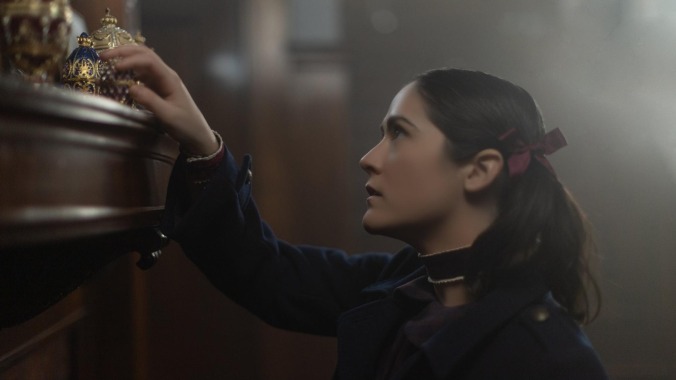In Orphan: First Kill, murder is more than child’s play
As twentysomething actress Isabelle Fuhrman reprises the role of a homicidal pre-teen, the filmmakers behind this prequel skillfully balance shock and schlock

In director William Brent Bell’s Orphan: First Kill, our favorite pint-sized, parent-less antagonist with a killer sensibility and the instinctual skill to slay all day is back and better than ever. While its title is a bit of a misnomer considering where this journey begins, it’s the rare prequel that surpasses the original. And similar to others in its genre, like Ouija: Origin Of Evil and Annabelle: Creation, it cleverly re-engineers those foundational building blocks to ingeniously complement its predecessor.
In a story set prior to the events of 2007’s horror film Orphan—which didn’t set box office records but developed a passionate cult following—psychopathic 31-year-old Leena (Isabelle Fuhrman) is a patient at the Saarne Institute. She’s affected by a gland disorder causing dwarfism, giving her the appearance of a young child. Posing as a runaway, she already killed one family in her native Estonia before arriving at the high security psychiatric institution, where she’s determined to break free. That opportunity arrives with the introduction of a new art therapy teacher (Gwendolyn Collins), who unwittingly transports the counterfeit kid to her apartment, to her own demise.
Assuming the identity of a missing 10-year-old American girl named Esther Albright, Leena successfully deceives the girl’s mother, Tricia (Julia Stiles) into “reuniting” her with Esther’s despondent dad Allen (Rossif Sutherland) and brother Gunnar (Matthew Finlan). Though Leena wrestles with a quick temper, she’s all too happy to play the part—at least until Tricia begins to identify some blatant inconsistencies in her alleged daughter’s memories. A robust, winking sense of havoc ensues.
Screenwriter David Coggeshall, working from a story by Alex Mace and David Leslie Johnson-McGoldrick, gleefully juggles shock and schlock, doubling down on the bonkers premise of the original while unearthing deeper into layers of this series’ villain, shepherding audiences into transformative new territory with delicious twists. Tonal shifts vacillate from serious to campy, which the filmmakers balance skillfully; this film, just like its predecessor, knows exactly what it’s doing.
Bell, along with cinematographer Karim Hussain, production designer Matthew Davies and art director Andrea Kristof, visualizes Esther’s psyche with subtle symbolism and shrewd use of foreshadowing. Mirrors and reflections register as a notable motif, reinforcing Esther’s duality. Wickedness is represented not solely through action but also aesthetic design, be it in an image juxtaposing an age-advanced sketch of Esther and a blood-splattered Leena, or the reflection of Esther on a grand piano while her actual self occupies just a sliver within the frame. Brett Detar’s score further augments the playful, sinister atmosphere, along with soundtrack selections by Interpol and Michael Sembello.
Like any good second chapter in an evolving franchise, the original narrative elements are properly expanded. Leena both gets her trademark velvet ribbons (and learn how she got those scarlet ones that adorn her wrists and neck), and cultivates the adoptive split persona that leads to lethal misdeeds. The filmmakers also pinpoint the formation of her Electra complex—fittingly stoked by a Shirley Temple movie—and draw further parallels between her and a similarly misunderstood creature, a cute rat, which she befriends in the Albright home.
Now that Fuhrman is too old to play the character’s pre-teen alter ego, Bell and his collaborators sufficiently disguise her twentysomething age by utilizing forced perspective and body doubles (Kennedy Irwin and Sadie Lee) when needed. Leena’s escape from the mental institution employs a harmonious symphony of blocking, performance, timing and editing (by Josh Ethier) to seell its trickery. However, other scenes later in the picture don’t sell the ruse as effectively.
Meanwhile, Fuhrman shows renewed, devilish insight in her creation that perfectly plusses the character’s complexities. The new scenarios and motivations offer fertile ground for her character work. Stiles, who once again delivers the goods in a Lee Remick-inspired performance, makes for a worthy scene partner and adversary, leading to thrilling scenes between the two formidable talents. She gives the role depth and dimension, especially after her character experiences a drastic alteration.
Despite a need for snappier pacing in the first and third acts—before and after big revelations occur—the film otherwise proves highly entertaining. Offering the winning combination of a subversive spin on a well-established villain, Orphan: First Kill is a gnarly, wild and absolutely demented ride.